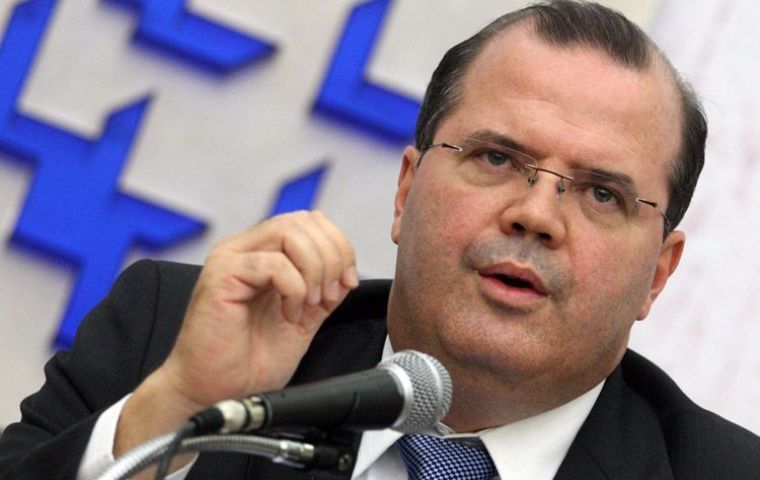MercoPress. South Atlantic News Agency
Brazil central bank says ‘recovery in underway’ and inflation in ‘under control’
 Tombini said the Brazilian economy will expand annualized 4% in second half of 2012 and in 2013
Tombini said the Brazilian economy will expand annualized 4% in second half of 2012 and in 2013 Brazil Central Bank President Alexandre Tombini Tuesday said “there are consistent signs that the recovery of economic growth is underway” and insisted despite some market skepticism, that inflation is “under control.”
Tombini's comments came in a speech at a conference organized by a Brazilian business magazine in Sao Paulo. He predicted the economy would grow at an annualized pace of “around 4%” in the second half of 2012 and for the full year 2013, a forecast consistent with market expectations, as measured by the Central Bank's own “Focus” survey of local financial institutions.
Tombini reaffirmed inflation is “under control” and “moving in the direction of the trajectory of targets, even if in a non-linear fashion.”
Similar phrases were in both in the October 18 Central Bank Monetary Policy Committee (Copom) minutes and the September 27 quarterly inflation report.
But the market is forecasting inflation of 5.43% this year and 5.42% next year-an extremely slow movement in the direction of the Central Bank's 4.5% target.
Markets are assuming that the Central Bank is, contrary to its mandate, sacrificing inflation in order to stimulate growth, but Tombini claimed otherwise in his speech before the business community.
“In the coming years, monetary policy will continue to be conducted having, as an exclusive focus, the commitment to price stability,” he said.
He said a weaker currency, the government's “expressive increase in the minimum wage,” and agricultural supply shocks due to climactic events led to higher inflation this year.
Bad weather in the United States was unpredictable, but since a weaker Real has been explicit government policy, and the minimum wage increase was promised in early 2011, it is unclear why the Central Bank was not prepared for them.
As for commodity prices, Tombini said “the evolution of inflation suggests that, in large part, the impacts of these supply shocks have already been transmitted to consumer prices, so the remaining impacts will tend to be smaller.”
The market consensus is that the Copom will keep rates at their record low 7.25% until at least the last quarter of 2013, and perhaps even through 2014, an election year.




Top Comments
Disclaimer & comment rules-

Read all commentsGood news
Nov 01st, 2012 - 02:38 pm 0Commenting for this story is now closed.
If you have a Facebook account, become a fan and comment on our Facebook Page!